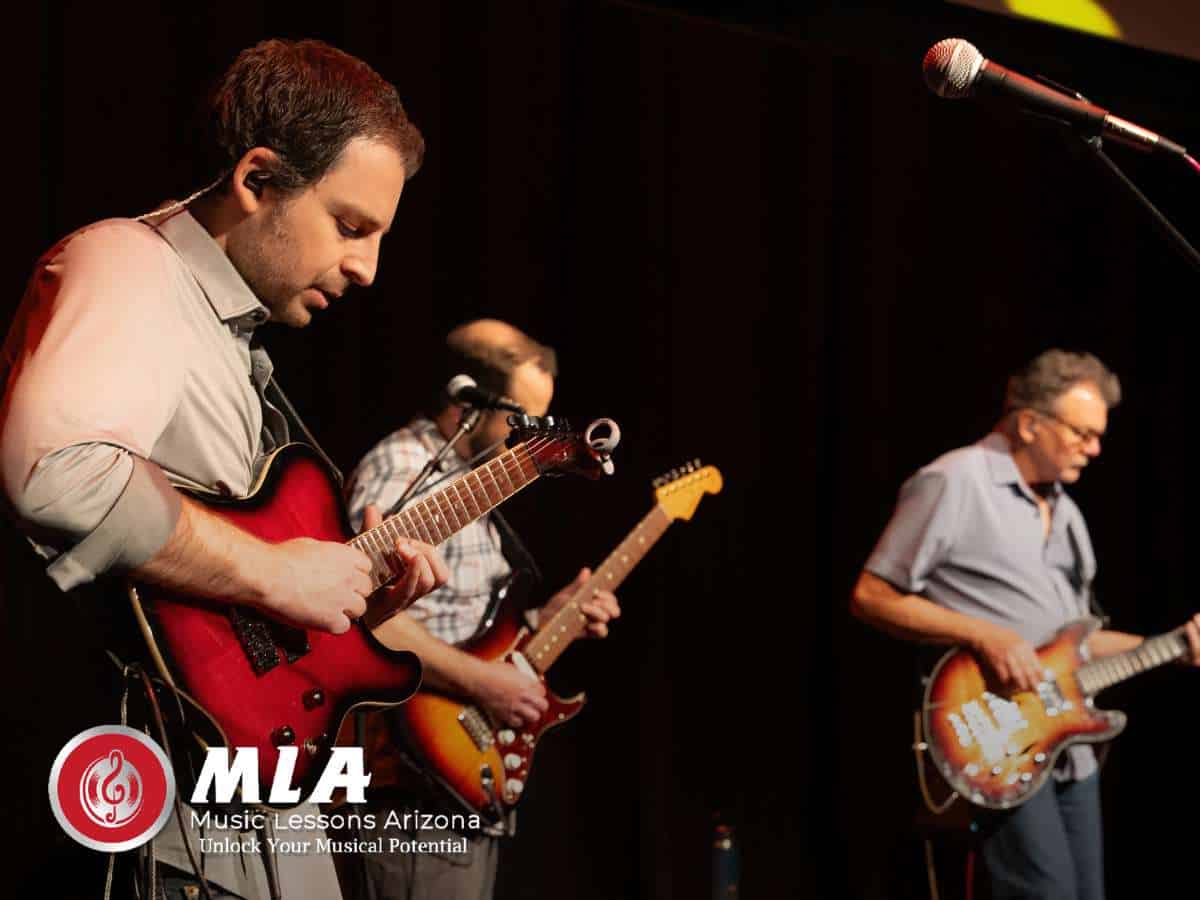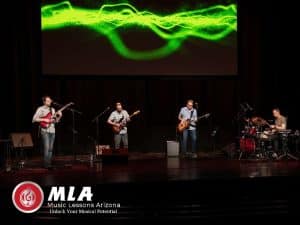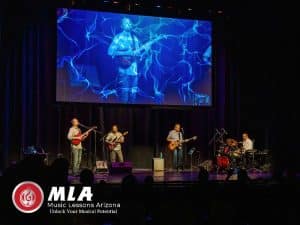Discover How Structure, Mindset, & The Right Environment Can Turn Your Casual Playing Into Real Musical Progress & Connection.
“Did I actually get better today? Or did I just mess around?”
You’re not alone.
Many adult guitarists find themselves in this spot—spending time on their instrument, but feeling like they’re circling the same ideas without real momentum. They’re not “beginners” anymore, but they’re not quite musicians in motion either.
And the most common challenges usually boil down to two things:
- 1. Lack of structure in their practice or approach
- 2. Desire to collaborate, but no idea where to start—or feeling too unsure of their skills to reach out
Let’s talk about how to break out of that cycle.

1. Stop Practicing Without a Purpose
If you’re like many adult players, you don’t think of what you do as “practice.” You just play—explore sounds, follow inspiration, chase new songs or licks.
There’s nothing wrong with that.
But without some intentional structure, your progress will hit a ceiling.
What Should You Actually Practice To Get Better at Jamming?
If your goal is to play confidently with other musicians, the answer isn’t to randomly cycle through tabs or noodle until something sounds good. You need to focus on the core skills that translate directly to real-world musical situations—especially jamming, improvising, and playing in a band setting.
Here’s where to start:
1. Rhythm Fluency

Great rhythm is what makes someone easy and fun to play with. This applies to both chord playing and improvisation. You want to be able to:
- Lock in with a groove
- Play consistent strumming or picking patterns
- Use varied rhythmic figures to make your playing musical and dynamic Drummers won’t carry you—you need to contribute to the time feel.
- Fretboard Fluency & Improvisational Vocabulary
To improvise expressively and not feel lost during a jam:
- Learn solos by ear from recordings
- Practice musical phrases and vocabulary that fit the genres you want to play ● Use scales in context—practicing them with different rhythms and patterns to build both technique and musicality
Don’t just run scales—make them sound like music.
- Know Songs Other Musicians Jam On
This is huge: if you want to connect with other players, you need to know the songs they like to jam on. Think blues, funk, rock, pop, and jazz standards—simple tunes with room to stretch out and solo.
Start building your personal song list now. Learn:
- 12-bar blues in multiple keys
- Common jam standards (e.g., “Cissy Strut,” “So What,” “Wish You Were Here,” “Come Together”)
- Pop/rock songs with simple changes that leave room for improvisation
The musicians who get called to jam are the ones who know the tunes—and how to make them groove.
Adding a simple framework like this to your playing time can turn those “did I actually get better?” moments into “wow, that’s getting easier!”
2. Build Skills That Lead To Collaboration
Most self-guided players get good at playing along—but not at playing with others. That’s because playing with others requires a slightly different set of skills:
- Keeping time and locking into a groove
- Knowing your role in a group (supporting vs. leading)
- Listening actively and reacting in real time
- Communicating ideas confidently—verbally and musically
If your dream is to jam, write, or even perform with others, it’s important to train those skills—not just more licks and theory.
Try this:
- Record yourself with a backing track and listen back—how well are you locking in?
- Play rhythm guitar over a drum track—can you make it feel solid and supportive?
- Improvise short, melodic phrases that respond to the groove—not just run scales
3. Learn The Language Of Music (Not Just The Vocabulary)
Many players learn the “words” of music—chords, scales, riffs—but never fully understand how to communicate with them.
You don’t need to become a music theory expert, but understanding the basics of keys, chord function, and how to outline progressions with your playing is essential if you want to:
- Improvise musically (not just fill space)
- Know what to play when someone says “this is in G”
- Feel comfortable in any jam, rehearsal, or open mic setting
A little practical theory goes a long way—especially when it’s taught in a way that applies directly to what you’re already playing.
4. Don’t Wait Until You Feel “Good Enough” To Jam
This is a big one.
So many guitarists tell themselves:
“I’ll reach out and play with others when I’m more confident.”
“I’ll join a band or go to a jam once I’m better.”
“I’m not ready yet.”
But that “ready” moment rarely comes on its own. Playing with others is not the reward for getting good—it’s how you get good.
It’s how you build confidence, grow your ears, and connect your playing to something meaningful.
The truth? You don’t need to be advanced—you just need the right environment.
How The Jam Experience Program Helps You Build Confidence & Jam With Others
At Music Lessons Arizona, I created the Jam Experience Program to give adult players a way to develop their skills in the context of real collaboration.
If you’ve ever wished you had:
- A clear path forward in your playing
- A way to jam and play music that feels connected and alive
- A supportive community of musicians who want the same things you do… …this might be the next step for you.
Here’s what the program includes:
- A weekly coached band format, where you jam with other adult players in a structured, low-pressure setting
- Real-time feedback from me (Matt Friedland), a professional musician with a Jazz Performance degree from ASU
- Practical theory and improvisation training, so you know how to play with others—not just alongside a track
- A community of musicians to grow with, collaborate with, and maybe even perform with
You don’t have to figure this out alone anymore. You just need to step into the right musical setting.
How To Find The Right Program To Start Jamming With Other Musicians

If your playing feels unstructured or aimless…
If you want to play music that feels alive and expressive…
If you’ve always wanted to jam, but haven’t had the confidence or opportunity… Let’s change that.
Visit our Adult Music Classes page to learn more and contact us to schedule a time to talk.
I’d love to help you connect the dots, find your voice, and experience what it’s like to really play music with others.
—
About the Author:
Matt Friedland is the founder of the Jam Experience Program at Music Lessons Arizona. A graduate of ASU’s School of Music with a degree in Jazz Guitar Performance, Matt helps adult musicians go from isolated and unfocused to confident, collaborative players—through structured practice, real-time guidance, and a welcoming musical community
